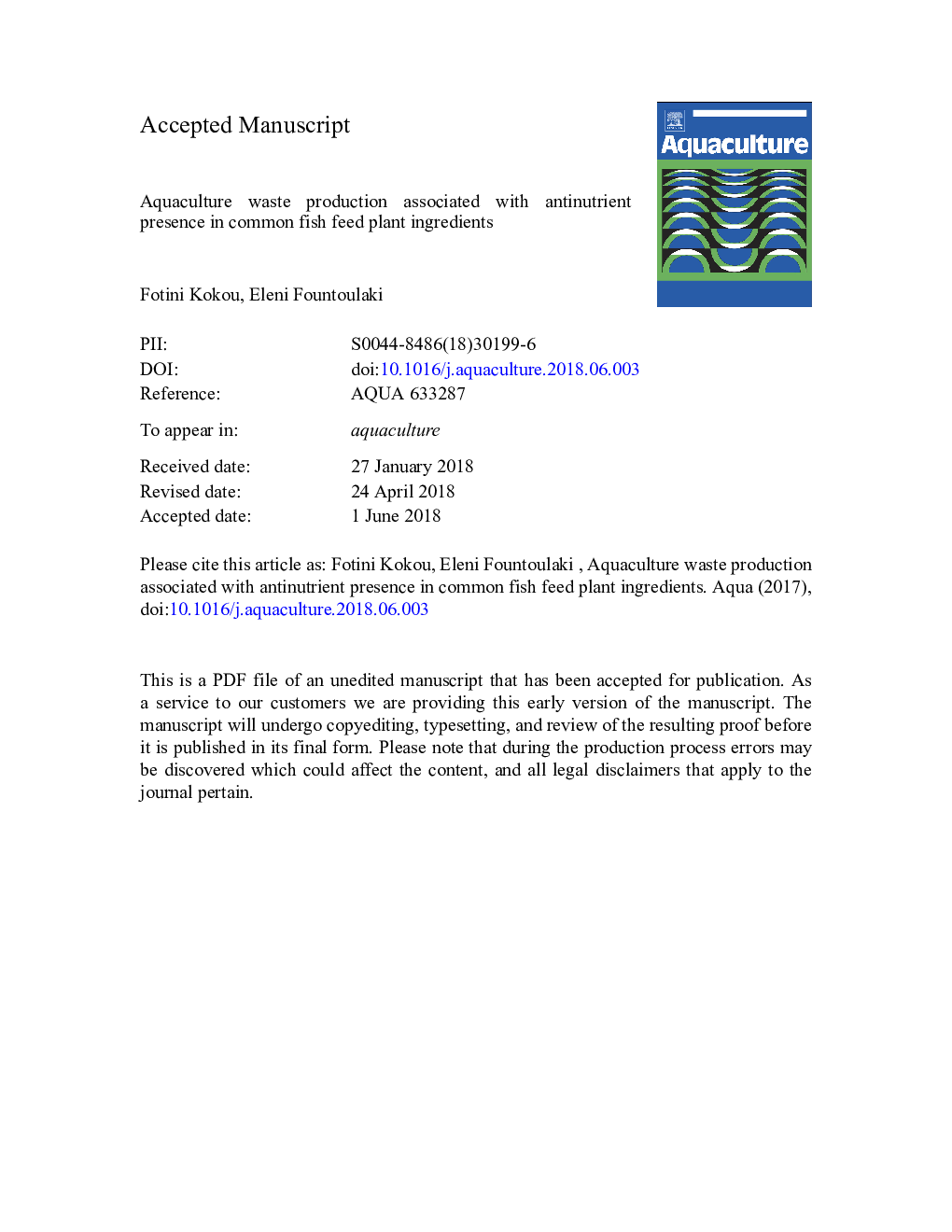| کد مقاله | کد نشریه | سال انتشار | مقاله انگلیسی | نسخه تمام متن |
|---|---|---|---|---|
| 8493046 | 1552793 | 2018 | 56 صفحه PDF | دانلود رایگان |
عنوان انگلیسی مقاله ISI
Aquaculture waste production associated with antinutrient presence in common fish feed plant ingredients
ترجمه فارسی عنوان
تولید زباله های آبزی پروری همراه با حضور غیرطبیعی در مواد غذایی گیاهی معمولی ماهی
دانلود مقاله + سفارش ترجمه
دانلود مقاله ISI انگلیسی
رایگان برای ایرانیان
کلمات کلیدی
SBMANFNSPBODFDMRASAquaculture - آبزی پروریFish meal replacement - تعویض غذا ماهیBiological Oxygen Demand - تقاضای اکسیژن بیولوژیکیRSM - روششناسی سطح پاسخRecirculation aquaculture systems - سیستم های آبزی پرورش گردش خونAntinutritional factors - عوامل ضد اضطرابCanola meal - غذای کانولاPhosphorus - فسفرdry matter - ماده خشکEnvironment - محیط زیستNitrogen - نیتروژنRapeseed meal - وعده غذایی کلزاFish meal - وعده ماهیnon-starch polysaccharides - پلی ساکارید غیر نشاستهCarbon - کربنSoybean meal - کنجاله سویا
ترجمه چکیده
استفاده از گزینه های جایگزین ماهی در آکوفئید ها به دلیل کم شدن ذخایر ماهیانه به طور فزاینده ای ضروری است. بنابراین، فرمولاسیون رژیم غذایی و اثرات آن همچنان یک چالش بزرگ برای پایداری بخش آبزی پروری است. مواد گیاهی به عنوان یک جایگزین پایدار برای غذای ماهی برای بعضی از گونه های آبزی پروری استفاده شده است. با این حال، حضور عوامل ضد اضطراب در بسیاری از این مواد، مانع پذیرش غذا و عملکرد حیوانات می شود و باعث سوخت و ساز بدن و هضم شدن می شود. علاوه بر افزایش هزینه های تولید، نگرانی های دیگر نیز از این تأثیرات ناشی از تولید مثل زباله تولید شده از مواد مغذی که در بیوماس ذخیره نمی شوند و در محیط زیست به عنوان تخریب مدفوع یا غیر مدفوع منتشر می شود، ناشی می شود. در این بررسی ما قصد داریم تا در مورد اثرات عوامل غلطکی که در ترکیبات معمولی مورد استفاده قرار می گیرند را در تولید زباله بررسی کنیم، زیرا ممکن است به تغییرات ناخواسته محیط زیست منجر شود. کاهش تولید خروجی های زباله می تواند به طور بالقوه از طریق بهبود فرمولاسیون غذا، طعم و مزه، قابلیت هضم و حفظ مواد مغذی به دست آید. اجزای گیاهی قابل جذب، مانند پلی ساکارید غیر نشاسته ای که در غلظت های بالا حضور دارند، باعث افزایش تولید مدفوع و تغییر خواص فیزیکی می شود. با این حال، تاثیر آنها به سیستم پرورش، یعنی قفس های باز، سیستم های جریان و یا گردش مجدد، بسیار بستگی دارد. همانطور که مطالعه خواص فیزیکی مدفوع یک منطقه نسبتا جدید است، هیچ توافقی در مورد بهترین پارامتر یا روش استفاده برای پیش بینی رفتار مدفوع در یک سیستم بازاریابی تجاری وجود ندارد. بنابراین شناخت سهم هر عامل ضد اضطراب و به ویژه نوشیدنی های غیر نشاسته در خصوص خواص مدفوع و تولید زباله و سطوح که حداقل اثرات زیست محیطی دارند، مهم است و در حال حاضر فاقد آن است.
موضوعات مرتبط
علوم زیستی و بیوفناوری
علوم کشاورزی و بیولوژیک
علوم آبزیان
چکیده انگلیسی
The use of fish meal alternatives in aquafeeds is increasingly becoming a necessity due to declining fisheries stocks. Thus, the dietary formulations and their impacts remain a big challenge for the sustainability of the aquaculture sector. Plant ingredients have been successfully used as a sustainable alternative to fish meal for some aquaculture species. However, the presence of antinutritional factors in most of these ingredients interferes with feed acceptance and animal performance, causing impaired metabolism and digestibility. Besides the increased production costs, other concerns also arise from these impaired effects, such as waste production originating from nutrients not retained in biomass and released in the environment as faecal or non-faecal losses. In this review, we aim to address the impacts of the antinutrient factors, present in commonly used plant ingredients, on waste production, as it may lead to unwanted environmental changes. Reduction of waste outputs can be potentially achieved through the improvement of feed formulation, palatability, digestibility and nutrient retention. Indigestible plant components, such as non-starch polysaccharides present in high concentrations, increase faecal production and alter faecal properties; however, their impact depends highly on the rearing system i.e. open cages, flow-through or recirculating systems. As the study of faecal physical properties is a relatively new area, there is no agreement on the best parameter or method to use for predicting faeces behaviour in a commercial rearing system. Therefore, knowledge of the contribution of each antinutritional factor, and especially of non-starch polysaccharides, on faecal properties and waste production, and the levels that have the least environmental impact, is important and currently lacking.
ناشر
Database: Elsevier - ScienceDirect (ساینس دایرکت)
Journal: Aquaculture - Volume 495, 1 October 2018, Pages 295-310
Journal: Aquaculture - Volume 495, 1 October 2018, Pages 295-310
نویسندگان
Fotini Kokou, Eleni Fountoulaki,
